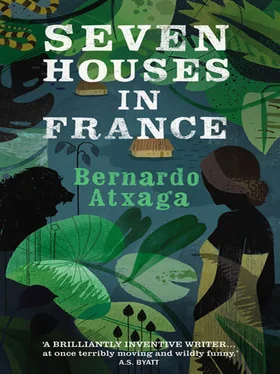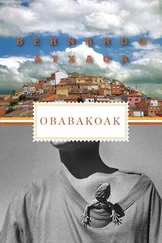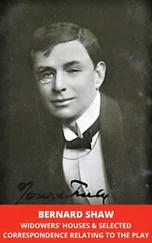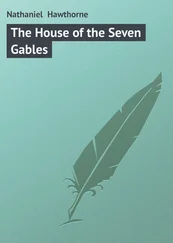He was still munching his way through his portion of antelope when something caught his ear. The others were discussing a subject he knew about. He listened more closely and heard the journalist, who was about the same size as Livo, recounting to the bishop and Lalande Biran an anecdote involving Duke Armand Saint-Foix. Although he had no desire to speak and no intention of doing so, he felt his mouth opening and closing as if it had a life of its own and exclaiming: ‘Of course! Armand! Monsieur X!’
Van Thiegel was sure he was right, because as soon as he heard the name ‘Armand’, the roulette wheel in his head had stopped at the letter X. Encouraged by this success, his mouth started talking about the difficulties involved in felling mahogany trees and transporting such a hard, heavy wood. However, he ceased this disquisition when he saw Lalande Biran’s blue-gold eyes, each of which was sending him a message:
‘Why don’t you shut up, Cocó!’ said Lalande Biran’s right eye.
‘Shut up this instant or I’ll put a bullet through your brain!’ said the left eye.
Everyone in Yangambi knew that Lalande Biran was very quick to draw his Luger pistol and that he usually aimed for the head. Van Thiegel’s mouth started speaking again, but on a different subject. It said:
‘Have you ever seen a lion, Petit Livo ?’
The journalist from Brussels said that he hadn’t, and the mouth continued talking about the king of the jungle until the roulette wheel moved on and showed him the image of another animal. It resembled a kind of flattened badger with extraordinarily powerful teeth.
‘Say what you like, but the true king of the jungle isn’t the lion at all,’ said the mouth. ‘There’s another animal, which is far superior to all the others. The blacks call it kaomo .’
The mouth went into further explanations, sparing no detail. When a lion saw a kaomo , it would run away with its tail between its legs so as to protect its masculine attributes. And that was because the kaomo had two modes of attack. First, it crouched near its enemy’s belly, then it pounced and tore off any pendulous body parts. A terrible punishment for any king, not just the king of the jungle. As someone once said, King Léopold himself would have far preferred to face the guillotine than be the victim of a kaomo .
The mouth formed into a half-smile and felt an enormous desire to go on giving explanations. Then Van Thiegel again caught sight of Lalande Biran’s eyes:
‘Why don’t you shut up, Cocó!’ said the right eye.
‘Look who’s sitting next to you!’ said the left eye.
He focussed his attention on the man beside him, none other than the bishop who had blessed the statue of the Virgin. He was fairly young and had very smooth skin; doubtless another poofter. And a new topic of conversation came into his head: what would a kaomo make of a man like that? The question did not, however, reach his mouth. If Lalande Biran didn’t want to talk about it, then they wouldn’t, and that was that.
He got up to go outside and passed by the table where the younger officers were eating. Chrysostome was among them. He was silent, concentrating on his portion of antelope, but he was wearing his shirt unbuttoned, brazenly showing off the blue ribbon and the gold chain on his flat, hairless chest.
‘A soldier shouldn’t go around showing his chest, especially not in the presence of a bishop,’ the mouth said. ‘Do those buttons up at once!’
This last sentence was followed by another, which the mouth chose not to say:
‘You can do what you like when you’re with Madelaine, but not here.’
Madelaine. That was the name he had given to Chrysostome’s supposed half-black, half-white girlfriend. But this was not the moment to mention her. The yokel mustn’t suspect that his secret had been discovered until the bishop and the journalist had gone and they — himself, Richardson and Biran — could put their plan into action. Yes, they had thought it all out. They would capture Madelaine and bring her back to Yangambi, where they would set her to work in the slaughterhouse or in the storerooms, and see how Chrysostome reacted. Richardson thought the yokel would be ashamed of his feelings and look the other way, as if he didn’t care what happened to the girl. Lalande Biran, on the other hand, foresaw a strong, even disproportionate response. Chrysostome wouldn’t be able to control his emotions and would make a complete fool of himself. There was nothing stronger than first love. It could turn a person’s head — especially a yokel’s head — more easily than ten bottles of champagne drunk one after the other.
Lopes spoke up in Chrysostome’s defence:
‘But sir, Chrysostome is simply following the Captain’s orders, as am I. He told us not to hide our faith.’
He himself was wearing a medal of Our Lady on a silver chain.
‘Is that what our religion teaches us?’ bawled the mouth. ‘To go around showing off our titties?’
Lopes and the other young officers roared with laughter. Chrysostome did not. He frowned and buttoned up his shirt.
‘That’s better,’ said the mouth.
Tired of standing, Van Thiegel’s legs were beginning to grow unsteady, undermining the serious tone he had wanted to give to his words. The officers’ laughter grew, as did the frown on Chrysostome’s brow. Somehow, Van Thiegel managed to push open the glass door and walk down to the river. Relieving himself did him good.
When he returned to the table, Lalande Biran was talking about lions. He was telling his guests that he had written a poem on the subject.
‘“Each on his own territory,”’ he began reciting, ‘“but what territory can accommodate more than one king? I do not speak, Calliope, of the struggle between white rose and red, nor of that other struggle, years before, between Hector and Achilles, but between Belgium and the Congo, between Léopold and the lion. Léopold raised his rifle, and thenceforth but one king reigned.”’
The diminutive journalist from Brussels was writing down Lalande Biran’s words. The bishop had his eyes closed, perhaps in prayer.
‘Our King in a duel with a kaomo , that’s what I’d like to see,’ said the mouth.
No one took any notice. The bishop started telling them about a recent meeting between Léopold II and the Pope.
The roulette wheel in Van Thiegel’s head began spinning faster, showing him, one after the other, images of people who were not there in the Club Royal. He saw Christine as she appeared in the photo he had hidden in his bedroom, all wet bathing suit and thighs; his mother in her house in Antwerp; his father in a room in Antwerp’s insane asylum; woman number 184 in the jungle, beneath an okoume tree; the first man he had killed by hitting him over the head with a chair, lying dead in a bar in Antwerp. The wheel continued spinning, showing more and more people, until it stopped on the image of his mother. She was saying: ‘The trouble with your father is that he was born too near the port.’ She meant that he was an alcoholic because he had been born in an area full of bars, which is why he was always getting into fights, sometimes in the street, sometimes at home; sometimes with sailors, sometimes with his wife or his son.
‘With me, you mean,’ said Van Thiegel’s mouth. His arm was raised, his index finger too.
The images he was seeing were closer to him now. Livo was placing on the table a dish of fried bananas and chocolates decorated with jungle fruits. Donatien was filling their glasses with champagne; the diminutive journalist was proposing a toast; the bishop’s cheeks were flushed and pink.
‘You look a little tipsy, bishop,’ said the mouth. ‘You have to be careful with champagne. But don’t worry, I won’t tell the Pope.’
Читать дальше












